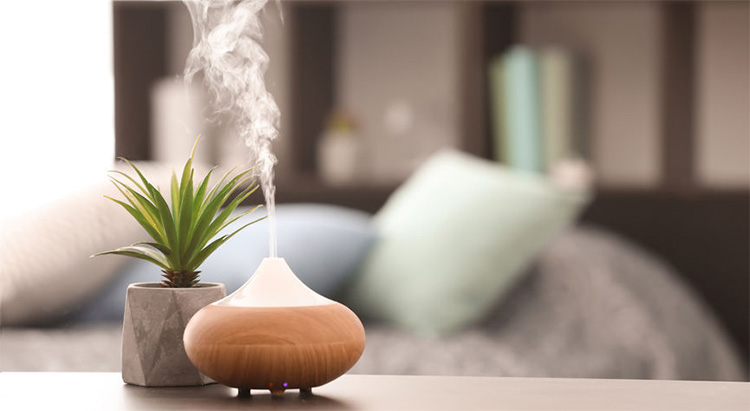Table of Contents
- Key Takeaways
- Why Diffuse Essential Oils? Understanding Essential Oil Diffusion
- Is Diffusing Essential Oils Safe?
- Are Diffusing Essential Oils Safe for Babies?
- Can Diffusing Oils Be Harmful?
- Why Diffuse Essential Oils?
- Is Diffusing Essential Oils Safe for Your Lungs?
- Conclusion
- Additional Tips and Resources:
The world of aromatherapy and essential oil diffusion has witnessed a remarkable surge in popularity as people seek natural ways to enhance their well-being. However, along with this trend come important questions: Is diffusing essential oils safe? Are they safe for babies?

Speaking of that, as per a report by Statista, Essential oils, which encapsulate the essence of a plant through aroma or taste, are expected to have a significant increase in global demand from 2018 to 2025. The demand is expected to increase dramatically, from 226.9 kilotons to 404.2 kilotons.
Despite the ever-increased market demand, the safety concerns regarding essential oil diffusion remains to be a topic of concern. In this article, we’ll walk you through the safety considerations, potential risks, precautions, and benefits of essential oils diffusion.
Key Takeaways
- Be cautious with babies, use baby-safe oils, and ventilate well.
- Use oils in moderation to avoid sensitivities, irritation, and headaches.
- Enjoy benefits like stress relief, better sleep, and mood enhancement.
- Stay informed, use oils responsibly, and seek professional safety guidance.
Why Diffuse Essential Oils? Understanding Essential Oil Diffusion
Before diving into “Is diffusing essential oils safe for your lungs?”, let’s first understand essential oil diffusion basics. This process involves dispersing aromatic molecules from essential oils into the air using specialized devices known as diffusers.
People use diffusers for various purposes, including stress reduction, relaxation, mood enhancement, and even to purify the air in their surroundings. For oil diffusion, there are several types of diffusers available. Such as ultrasonic, nebulizing, and heat-based models, each offering its own method of dispersing essential oils.
Is Almond Milk Good for Weight Loss? Find Out!
Is Diffusing Essential Oils Safe?
According to a report, the Aromatherapy Diffuser Market is expected to be valued at roughly $1.42 billion in 2023 and approximately $2.02 billion by 2028. Over the projection period, this growth reflects a compound annual growth rate (CAGR) of roughly 7.37%.
Does Brown Rice Help With Weight Loss?
These stats are simply a portrayal of the growing popularity of the concept of essential oil diffusion. To learn more about it, let’s jump into the topic of essential oils diffusion safety. Comprehensively, the answer largely depends on various factors:
1. Quality of Oils
Essential oils diffusion safety begins with the quality of the oils you use. It’s significant to select pure, high-quality essential oils from reputable sources. Poor-quality or adulterated oils can potentially pose health risks.
2. Proper Ventilation
Adequate ventilation is crucial during diffusion. You must ensure that the room is well-ventilated to prevent the buildup of vaporized oils in the air. Poor ventilation can lead to respiratory discomfort or irritation.
3. Responsible Use
Responsible use is key to safety. You need to abide by guidelines, avoid excessive use, and closely monitor for adverse reactions are essential steps in safe diffusion. If you have underlying respiratory conditions, exercise extra caution and seek expert advice.
How to Make Exercise Bike Seat More Comfortable?
Are Diffusing Essential Oils Safe for Babies?
The safety of diffusing essential oils around babies is a topic of concern for many parents. Here are some important considerations:
1. Choice of Oils
Not all essential oils are safe for babies. Some oils can be too potent or have adverse effects on infants’ delicate respiratory systems. It’s crucial to use oils that are considered safe for babies, such as lavender or chamomile.
2. Distance from Diffuser
Ensure that the diffuser is placed at a safe distance from the baby’s crib or play area. This prevents direct exposure to the diffused oils and minimizes the risk of adverse reactions.
3. Ventilation
Maintain proper ventilation in the room where the diffuser operates. Proper airflow helps disperse essential oil vapor more evenly and reduces the concentration in the air.
4. Consultation
If you have concerns or questions about using essential oils around infants, it’s advisable to consult with a healthcare professional or a qualified aromatherapist. A specialized pediatrician in aromatherapy can best help you with your concerns.
Is Couscous Gluten Free? All You Need to Know
Can Diffusing Oils Be Harmful?
While essential oil diffusion is generally safe when practiced responsibly, it’s essential to be aware of potential risks:
1. Skin Sensitivities
Some essential oils, when undiluted or used in excess, can cause skin sensitivities or allergies. Remember to follow recommended dilution guidelines, especially if applying oils topically.
2. Respiratory Irritation
In rare cases, diffusing certain essential oils in excessive amounts or using oils that individuals may be sensitive to can lead to respiratory irritation. Maintaining proper ventilation and avoiding overuse can mitigate this risk.
3. Headaches
The question of whether diffusing oils can cause headaches arises from time to time. While some people find the aroma of certain oils soothing. Others may experience headaches if exposed to strong fragrances for an extended period. It’s essential to use oils in moderation and choose scents that you find pleasant and non-irritating.
Why Diffuse Essential Oils?
With essential oils diffusion safety guidelines in mind, let’s explore why people choose to diffuse essential oils:
1. Stress Reduction
Aromatherapy is renowned for its stress-reducing effects. Oils like lavender, frankincense, and bergamot are often used to create a calming atmosphere and reduce stress and anxiety.
2. Improved Sleep
Many individuals turn to essential oils to promote better sleep. Oils like chamomile, cedarwood, and lavender can create a relaxing bedtime ambiance.
3. Mood Enhancement
Essential oils like citrus (e.g., lemon, or orange) can uplift your mood and create a positive atmosphere, which is particularly helpful during moments of stress or low energy.
4. Natural Air Freshening
Essential oils provide a natural alternative to chemical-based air fresheners. They can purify the air and leave your space smelling pleasant.
Is Diffusing Essential Oils Safe for Your Lungs?
Essential oil diffusion can be safe when practiced responsibly. To ensure essential oils diffusion safety:
- Select high-quality essential oils from reputable sources.
- Maintain proper ventilation in the room during diffusion.
- Follow guidelines for responsible use and avoid excessive exposure.
- Monitor for any adverse reactions, especially if you have pre-existing respiratory conditions.
Conclusion
Now that you’ve your answers to “Is diffusing essential oils safe for your lungs?” Remember that essential oil safety is an important consideration. And, it’s vital to decide while taking all necessary precautions regarding the oils and how you use them. When used with care, essential oil diffusion can be a valuable addition to your well-being routine.
Additional Tips and Resources:
- For in-depth information on essential oils diffusion safety and usage, consider exploring resources from reputable sources like the National Association for Holistic Aromatherapy (NAHA).
- If you have specific concerns or questions other than “Is diffusing essential oils safe for your lungs?”, consult with certified aromatherapists for personalized guidance.




